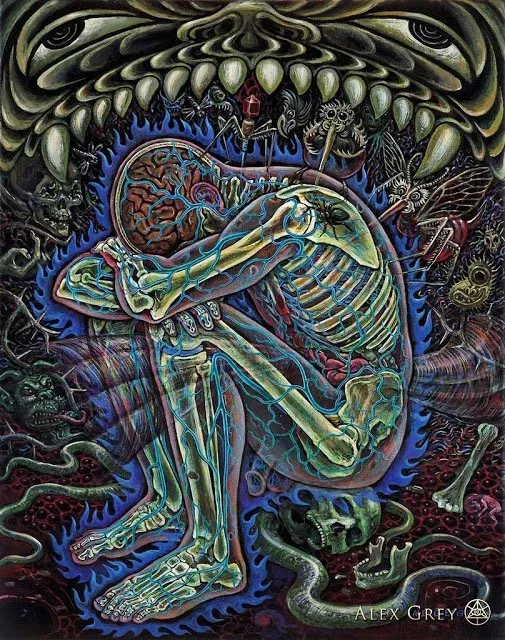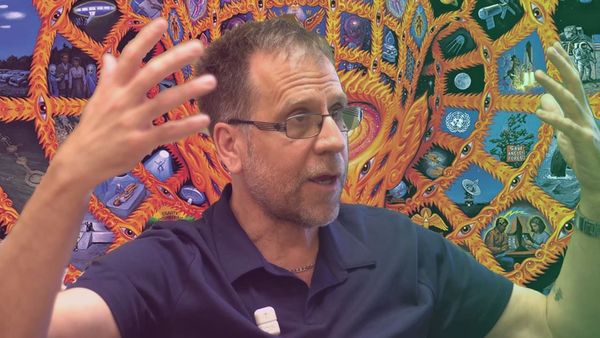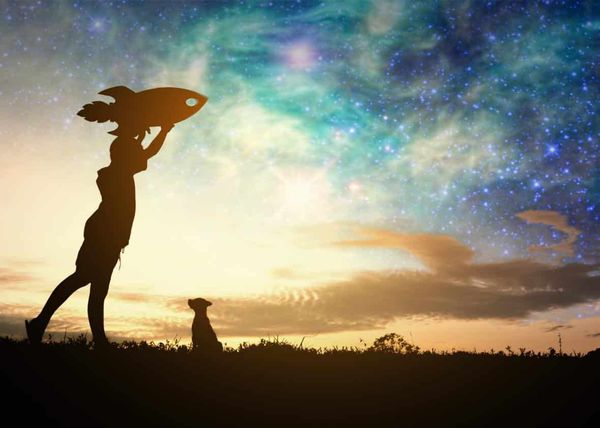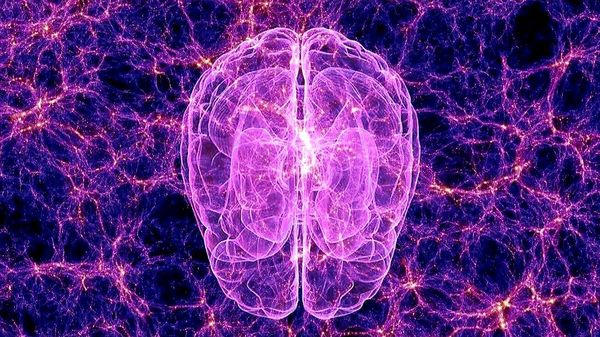Jon Waterlow • • 9 min read
6 Brilliant Terry Pratchett Proverbs for Growth, Creativity, and Living a Fulfilled Life
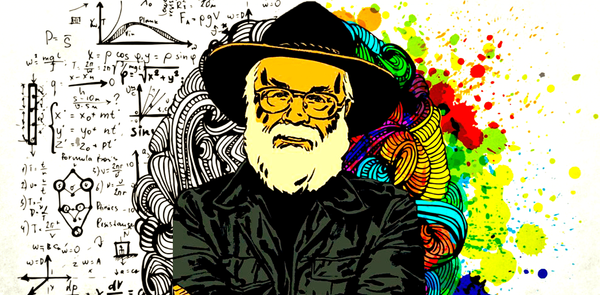
Terry Pratchett was a surrogate parent to me; growing up, he showed me the world for all that it was and could yet be. When he died two years ago, aged 66, from early-onset Alzheimer’s, I cried. In grief, but also in gratitude for all that he’d left behind. His words continue to reverberate through my life as I try to live it the best I can.
His novels were incredibly funny, weird, and playful, and so the literary critics hated him. They dismissed his books as frivolous and silly, as mere pun-laden pastiche. But millions of readers thought otherwise and begged, borrowed or stole his books (at one time he was the most shoplifted author in the world). He’s now widely hailed as one of the finest writers of the century, but his genius as both a writer and observer of the human condition went unrecognized for decades.
He wrote Fantasy – in the critics’ view, the lowest tier of ‘genre’ fiction. But Pratchett used that fantasy backdrop and his razor-sharp wit to explore what it means to be human. He held up a mirror to our nature and played with the warped and colorful images he saw in the reflections. He exposed the corruption and deceptions of governments, technologies, ideologies, and – most important of all – of the ordinary person like you and me. Amidst the wizards, trolls and vampires, his books burned with anger at the needless suffering and cruelty of the world.
He didn’t simply mock and criticize, but threaded small beacons of hopeful wisdom through the pages of his 40-odd novels that lit the way to a better, more compassionate world.
So here are six of his finest moments – short quotes I’ve selected from that thread of glowing guides which strike at the heart of life itself. They are all about how to live and live well, while playfully teasing us for how easily caught up we become in telling ourselves stories that can trap and confine us.
They’re about growth and change; the dangerous allure of certainty; and what it really takes to be a creative mind, alive to the worlds inside and outside of ourselves.
We begin as we’ll all end, with Death – the Grim Reaper himself, who was the only character to appear in every one of Pratchett’s Discworld novels. Despite being a 7-foot tall, scythe-wielding skeleton, Death’s laconic and confused attempts to understand humanity produced some of the most philosophically wry moments in modern literature. This one, I think, stands out:
“People’s whole lives do pass in front of their eyes before they die. The process is called ‘living’.” (The Last Continent)
Why do we wait until the world forces us to assess where we are in life? To think we have to wait for a wake-up call – a terrible accident; a brush with death – to appreciate the present is not only misleading, it’s positively destructive.
The story is happening now, and you are creating it. If we don’t embrace the story with awareness and presence right now, we miss the whole show. As the saying goes (made famous by John Lennon, but not coined by him), “Life is what happens to you while you’re busy making other plans”.
Life is in the living, not the planning. And if you stand at the crossroads of indecision for long enough, you have made a decision: The decision to stand still and never move forward into the unknown. It’s easy for this to seem stressful – to think we have to wring every last bit of meaning or productivity from each moment. But stories are formed of beats; the pauses and the downtime (as well as the times of confusion and getting lost) are part of the natural rhythm which is life itself. Highlight reels are only highlight reels because they omit the majority of events. But without those omitted pieces, the highlights wouldn’t mean much, either.
“Why do you go away? So that you can come back. So that you can see the place you came from with new eyes and extra colours. And the people there see you differently, too. Coming back to where you started is not the same as never leaving.” (A Hat Full of Sky)
Leaving our birthplaces and the people we grew up with seems perfectly natural these days – much more so than it would’ve to people a couple of centuries back. But with this newfound sense of expansion there can also be a more toxic sense of disappointment and failure if, after your travels, you come back home and settle down into “normal” life.
But as Pratchett says, literally and metaphorically we go on journeys – in the world and of the soul – so that when we return we’re changed, and so our world is changed too. Coming back can never be the same as staying put; as we change, the world we’re able to perceive changes. You don’t need to rescue a Princess and take out a Death Star to experience The Hero’s Journey.
You don’t need money for airfare, either. Travel happens in the mind as much as in geography; “home”, “self” and “adventure” are not, to paraphrase Herman Melville, on any map, because “true places never are”. To encounter a different culture by engaging with another group of people can be as profoundly mind-altering as travelling to Asia. Taking a psychedelic in your bedroom can be as pattern-disrupting as camping in Antarctica.
When we come home, we also come home to ourselves – changed, but familiar. The snake sheds its skin, but it’s still the original snake. Still, this call to adventure isn’t the same as going “looking for yourself”. The trouble with people who go looking for themselves is that all they’ll ever find is someone who’s looking for themselves. The point is to become who you are on the journey, not to think that what you desire lies outside of yourself, like some magic trinket or ultimate destination.
Pratchett grew up on Tolkien, and as Tolkien put it so beautifully: “Not all those who wander are lost”. Life isn’t about the destination; it’s about the journey. If it was about the destination, life would simply be about death.
“This is where we’ve filled ourselves up with so many questions that they’re starting to overflow and become answers.” (Feet of Clay)
This one is more obscure, but it holds hidden depths.
Grasping for definite answers in life is a losing game, like trying to catch a river in your hands. And yet still we keep on trying. We want certainties, we want to know for sure we’re on the right path, that we made the right call, that we chose the right lover. But this is impossible; change is the only constant in the universe, and we can never escape our own subjective experiences.
Nothing is fixed and everything is a matter of perspective. Certainty is a mind-trap; it’s where the fearful go to become zealots and ideologues, intolerant of any “truth” other than their own. No true scientist and no philosopher worth their salt are ever “certain”. As Voltaire put it back in the day, “Cherish those who seek the truth but beware of those who find it”.
Answers are an ending, a death of sorts; questions keep us growing. What this simple line from Pratchett is getting at is that when we keep asking more (and better) questions, we’re on the road to learning – learning based not on assumptions, but on an open mind and a beautiful curiosity.
The question of Life, the Universe, and Everything was famously answered by another master of comic literature, in Douglas Adams’s Hitchhikers’ Guide to the Galaxy series. It’s 42. Unfortunately, this didn’t really satisfy anyone as an answer, prompting redoubled efforts to discover the ultimate question…
Behind the surreal irony, Adams was making a crucial point: what you ask determines what you find. So, what questions are you asking? And, as with enigmatic Zen koans (which often flower into powerful hilarity), can you be open to the answers which emerge from within the questions themselves?
“If you ignore the rules people will, half the time, quietly rewrite them so that they don’t apply to you.” (Equal Rites)
This isn’t an invitation to sociopathy. But it is an invitation to take risks and not assume there are hard rules and unpassable boundaries caging your ambitions and creativity. The people who make the biggest change in the world are those who forge their own paths, which means walking through walls that, when they pushed them, turned out to be merely the smoke of assumption and tradition.
As Neil Gaiman, an old friend and collaborator of Terry’s put it in a graduation address that later went viral, “The rules on what is possible and impossible in the arts were made by people who had not tested the bounds of the possible by going beyond them.” Therefore, he continues with a bracing shake to the
shoulders of every creative person scared of putting themselves out in the world: “If you don’t know it’s impossible, it’s easier to do”.
Sound scary? The outliers, mavericks and revolutionaries are too often seen as innately different to the rest of us, as though they were born with some quality which meant they were always destined for greatness. We all have our own unique qualities, but “genius” and “greatness” are forged in the fires of work, commitment to your mission and, most importantly, by never letting go of your childlike curiosity and desire to learn.
Turning up and doing the work is just as important as having an idea. As Pratchett put it in one of his books for children: “If you trust in yourself…. and believe in your dreams…. and follow your star… you’ll still get beaten by people who spent their time working hard and learning things and weren’t so lazy” (The Wee Free Men).
Rules, Pratchett used often to say, are more like guidelines. Guidelines, like training-wheels, are useful, but they don’t bind our hands and our minds so that we can’t explore.
When we act with confidence and conviction, we find ourselves forging a path into the unknown, beyond what was thought possible. This can be daunting, but it’s the only way to find our own journey. As the great psychologist Carl Jung put it: “If the path before you is clear, you’re probably on someone else’s.”
On the other hand, breaking the rules for the sake of breaking the rules is a little different and usually not very useful. If you spend your time focused on pushing against the system, you’re defining your life by that system. Wilfully breaking a law is different from doing so without realizing. The truly creative walk through the rules and out the other side because they just don’t really recognize their existence.
Sometimes, though, it’s vital that we say no to the way things are.
“[People] accept evil not because they say yes, but because they don’t say no.” (Guards! Guards!)
Pratchett was fascinated by the human capacity for evil. He was smart enough to discern that most of it happens due to pain, ignorance, and fear. But while he unpicked and revealed those factors, he was also driven by a moral rage to show us how we can be so much better.
Speaking out against injustice can be the hardest thing to do. To stand up (often without visible support) means to take action, but acceptance can happen without lifting a finger.
Orthodoxy is ultimately more about silence than agreement.
The challenge is not to be a hero, but to act for what you believe to be right. A moral compass isn’t something you wave around trying to gain attention. It’s an orientation into and through life.
Which leads to this last, hopeful quote.
“Good and bad is tricky,” she said. “I ain’t too certain about where people stand. P’raps what matters is which way you face.” (Witches Abroad)
Morality, like so many human concepts, is a spectrum.
Philosophers have debated these questions for as far back as we can see, but spectrums can’t be nailed down and nothing fixed is alive.
Sometimes there’s no way to know for sure that we’re doing the right thing. But if we don’t do something, we end up frozen at that crossroads I mentioned earlier, or amidst the silent majority who accept the harmful actions of others.
But what we can do is orientate ourselves by our guiding stars and values. When we act from a place of compassion, even if we say or do something which backfires in the moment, we are still ultimately on the right path. We learn; we grow; we keep moving forward, even if we take the long, difficult way around sometimes.
But, again, it’s the journey that shapes everything. Wandering isn’t the same as being lost; arriving isn’t the same as never leaving. Whatever our goals are, how we get there is just as important as the goals themselves.
All these quotations are ultimately about growth. Growth beyond our current selves, beyond accepted “wisdom”, and beyond the childish urge for certainty, so that, if our lives do play back one more time when Death places a bony hand on our shoulders, we can be proud of who we’ve been and how we’ve
grown.
The Last Continent by Terry Pratchett
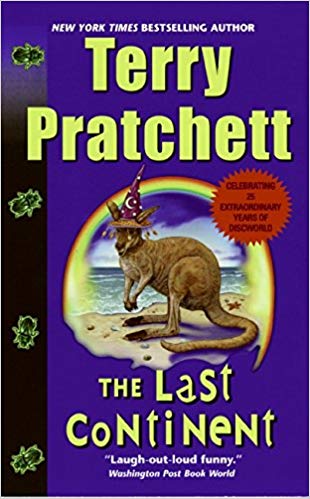
If you’re ready to dive deep into the rabbit hole of Terry Pratchett’s wonderful fictional tales, start with the Last Continent. An exuberant exploration of Discworld and the mind of the author himself.

